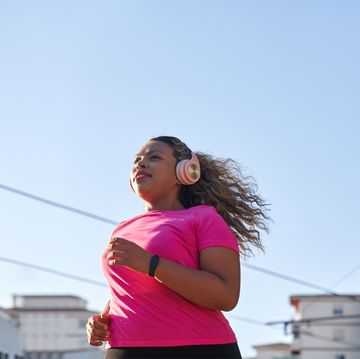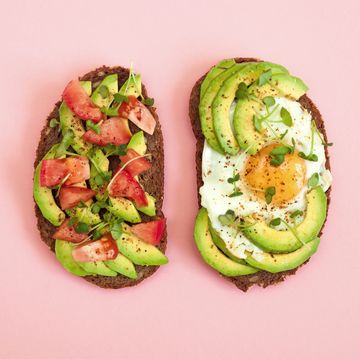When both you and a pal are trying to drop pounds, the buddy system might seem like the best idea. Working on it together, rooting for each other, and holding each other accountable all seem like perks, but a new study shows that pairing up to slim down can have some unintended negative consequences.
The research, published in the Journal of Health Psychology, tracked the weight loss and also the mental health of pairs of female roommates separated into three groups: pairs that both dieted, pairs where only one dieted, and pairs where neither dieted. While the dieters did lose more weight than the non-dieters, the average loss was less than a pound, and the researchers also noticed higher anxiety, stress, and depression in the pairs where both people were dieting, suggesting that the buddy system doesn’t always promote healthy weight loss. One possible reason for this, according to the study, is that when both people dieted, it led to “co-rumination” (read: constantly talking about it), which can increase stress. (Here are a few ways that stress messes with your body.)
“While dieting with a friend, may sound like a helpful support system to reach your goals, keep in mind that what works for her may or may not work for you, so you should both figure out what guidelines you want to follow both separately and together,” says Brigitte Zeitlin, R.D., owner of BZ Nutrition. As for those guidelines, Zeitlin offers some below. Read through to help you decide whether the buddy system is the right strategy.
How much weight she’s trying to lose or her workout style might be factors you consider, but what’s most important is choosing a friend who will support you along the way, regardless of her own success with it. “You want to pick a friend that is going to encourage you to stay on course, even when she has fallen off a bit, and you want someone who isn’t going to get all preachy when they reach their goal weight before you do,” says Zeitlin. So assess your friend’s personality traits more than her ability to keep up with your running pace.
RELATED: THIS IS THE BEST WORKOUT FOR WEIGHT LOSS, ACCORDING TO SCIENCE
What you eat, when you eat, and how you work out are all personal to you, so it’s not worth trying to come up with one plan and expecting it to fit both your needs. Instead, each of you should choose a few areas of weakness that you know you will need help with, whether that’s just making it to the gym, resisting snacking, or passing on that second round at happy hour. Those are times you can expect her to be there for you, and you for her.
Check out some of the weirdest weight-loss trends through history:
Even though you won’t be eating and doing all the same things, still choose a friend that has a healthy approach to weight loss, not someone who wants to do a week-long juice cleanse or a super restrictive diet. That plan will be unsustainable, and she’ll likely veer off track. It’s hard to be an accountability buddy when you’re following two totally different plans.
RELATED: I STOPPED EATING CARBS AT NIGHT FOR TWO WEEKS—HERE'S WHAT HAPPENED'
Are you feeling motivated and encouraged? That’s a sign your particular buddy system is doing its job. If you’re judged or shamed, you should probably call it quits and dissolve the partnership. And consider the same for yourself, says Zeitlin. Are you being encouraging and supportive? (Dance your way fit with High-Intensity Dance Cardio, the first-ever socanomics DVD!)
Of course you’ll have to check in with each other (that’s the whole point of having this buddy), but it should not take over all your conversations (that’s the co-ruminating problem we mentioned earlier). In fact, Zeitlin suggests limiting it to 15 minutes. Meet up for lunch, and finish your check-in by the time your entree arrives. Or set up a weekly call that’s specifically designated to talk about your progress, but then that’s it for the week.
RELATED: 5 TRAINERS SHARE THEIR #1 TIP FOR CLIENTS TRYING TO LOSE 10 POUNDS
If one-on-one isn’t your style, enlist other pals. Instead of meeting up for happy hour, arrange times to try out new fitness classes together or to go for a walk. “This way you’re bonding over your last date or intense boss, while still burning calories and staying on track, but without having to turn down a glass of wine or stress over what to order on a menu,” says Zeitlin.
RELATED: We Got A Ton Of Nutritionists To Share The One Tip They Give Clients Who Want To Lose Weight
Even though you’re in it together, you can’t depend solely on your friend to keep you in check and watch over all your decisions. “Keep a food journal so that you are accountable to yourself, and use the buddy system to get over some extra hard humps for you,” says Zeitlin. “This is the best way to achieve your goals and maintain a great friendship long after the diet is over.”













